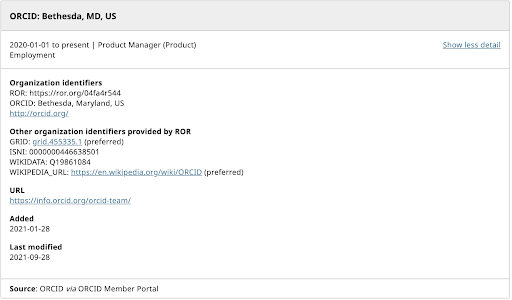This is a guest post by the ORCID team that was originally published on the ORCID blog. See the original post here.
Add Research Institution Identifiers with ROR!
As part of our ongoing commitment to increase value to our researchers and our members, we are pleased to announce that the Research Organization Registry (ROR) has been added to the ORCID Registry as a disambiguated Organization ID. ROR can now be used with the API and our Affiliation Manager to record research institution identifiers and metadata, thus making it easier to track the impact of institutional research. ORCID’s own staff affiliations have now been updated to include a ROR ID!
Example of ROR in an ORCID record
Example API code for ROR
A short history of ROR’s inception
The scholarly research community depends on a series of open identifier and metadata infrastructure systems to accurately identify and disambiguate researchers, their work, and the institutions that support that work.
To help complete a missing piece of the infrastructure puzzle, ROR was launched in 2019. It is now a collaborative initiative run by California Digital Library (CDL), Crossref, and DataCite.
Why ROR? Why now?
There are numerous ways data is used within the persistent identifier (PID) ecosystem, and affiliation is the key. Knowing where research is coming from, accessing clean and consistent data, and being able to report on the output of institutional research is central to many research stakeholders.
Because ROR is completely open with their datasets and API, it is a natural fit with ORCID’s mission and vision and helps simplify a complex mix of metadata systems. With persistent IDs and metadata for more than 102,000 organizations—and with these IDs also supported in other systems like Crossref and DataCite—ROR further enables research outputs to be more effectively linked to institutions.
A Look Ahead
When thinking about the future, it becomes clear that the future is now. The PID ecosystem has been developing over the past decade, and the organizational metadata provided by ROR is a critical piece of the PID puzzle.
Having a core set of open, trusted, globally unique IDs makes research more discoverable and more useful to everyone within the ecosystem. Now that more pieces are in place, more tools can be built to extract meaningful information from all of the PID connections.
Here at ORCID, we continue with our work to integrate ROR into the Registry. With our focus now switched from the API to the UI, we know that choosing an organization from the current dropdown list in the record can be confusing for users due to duplicates or formatting issues. We plan to streamline this experience to include ROR data as the default when users are manually adding affiliations to their ORCID record. This will result in a simplified experience for the record holder and will also mean the majority of manually-added affiliations will be linked to a ROR identifier.
If you need assistance adopting ROR within your ORCID integration, please reach out to your Consortial Lead or your Engagement Lead.
Tom is ORCID’s Product Director, he ensures our technology is responsive to our community and aligned with our mission.
Paula is ORCID’s Product Manager, responsible for gathering, managing and refining the requirements of the ORCID user community, with a specific focus on members and integrators.
Dan is our UX designer. He works making sure we have usable, accessible products that are a joy to use.
RSS Feed
Categories
Archives
Tags
- adoption
- annual-meeting
- api
- aps
- caltechdata
- clarivate
- clear-skies
- coki
- communication
- community
- cross-post
- crossref
- curation
- data
- datacite
- datasalon
- development
- dryad
- europepmc
- facilities
- fairsharing
- feedback
- figshare
- funders
- governance
- grei
- grid
- hierarchy
- implementation
- integrations
- interviews
- inveniordm
- jobs
- latin-america
- machine-learning
- matching
- metadata
- mvr
- open-access
- open-infrastructure
- openalex
- optica
- orcid
- osf
- persistent-identifiers
- pidapalooza
- pids
- prototype
- publishers
- publishing
- registry
- research-integrity
- researchequals
- resources
- rockefeller-university-press
- rrid
- schema
- scholastica
- silverchair
- steering-group
- straininfo
- sustainability
- team
- web-of-science
- working-group
- zenodo